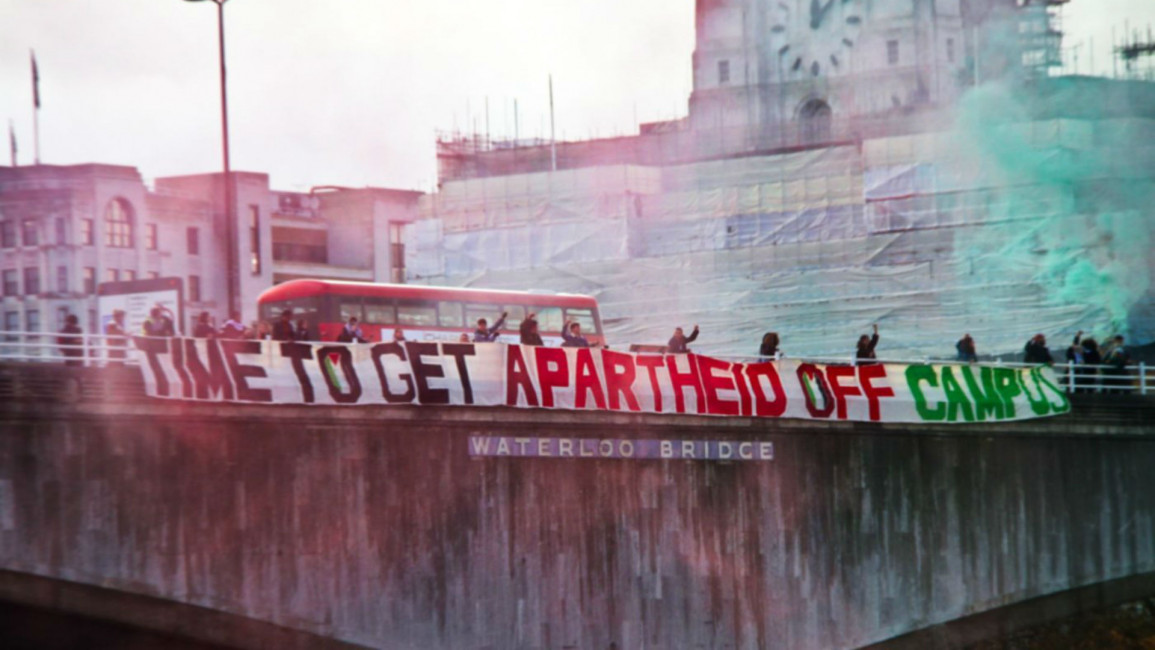
It's time to end complicity between UK universities and Israeli apartheid
In the UK, the defeat of the Corbyn project was in part made possible through the vilification of the Palestine solidarity movement, and contributed to destroying much of the existing infrastructure of resistance.
Under the guise of fighting anti-Semitism, instead of actually putting resources towards doing just that, the Right spent Jeremy Corbyn's term as Labour leader attacking allies and Palestine activists.
We should not forget that much of what was batted off as mere paranoia - or worse as conspiracy theories - in relation to the targeting of pro-Palestine political figures in the UK by the Israeli government, has since been backed up with other evidence.
The very real attempts by Israeli officials to influence and shape the British political landscape by undermining those most prominently associated with Palestine solidarity in the public eye, came to light. Yet, despite an embassy official being caught on camera discussing the targeting of specific MPs, no official response followed. Instead, the media and government onslaught continued apace.
Those on the political Right who seek to spread a pro-Israel agenda are feeling, quite understandably, empowered by the current political context. Not only because of their victories on the international stage, but also in Palestine.
 |
A network of this nature, bold enough to demand an end to UK universities' complicity with Israeli apartheid through financial and institutional links isan important start |  |
The plans for further annexation of West Bank land are set to go ahead, following the formation of the Netanyahu-Gantz unity government. These proposals, which the Palestinian authorities have said will mean the loss of between 30-40 percent of the occupied West Bank, will be put before the Knesset as early as 1 July.
This all comes with a green light from the US government which is also pushing ahead with its ironically named "Peace to Prosperity Project", that further seeks to strengthen Israel's grip over Palestinian land and people.
The situation is therefore critical and the onslaught against the solidarity movement of the last 10 years at least, and the huge power imbalances that underpin it, are of course worrying.
Twitter Post
|
But, such times of heightened oppression and repression have also invited opposition. If the experiences of the Corbyn years have taught us anything, it is that our resistance must be amplified, not watered down in order to frame Palestine solidarity as less radical, to cater to an imaginary and always illusive "centre".
Young people, students and grassroots activists who have watched as emerging leaders and vocal front-line comrades are dragged through the media in an attempt to vilify their personalities and weaken their political base, are rightfully tired and angry. They are also taking action.
This week the Apartheid Off Campus (AOC) network was launched by campaigners across the UK, a bold response to the debilitating times that we are living through. The movement, which is easily the most exciting development in recent times for Palestine solidarity, aims to provide the tools and space to organise activists across the country and coordinate campaigns.
Read more: Erasing the Palestinian refugees: Trump, UNRWA and the Nakba at 72
They will focus on pressuring their institutions into divesting from companies that are complicit in, as well as severing academic links with institutions that sustain the continued colonisation of Palestine.
This is "a necessary national and international network of student activists that collectively can combat the violent discourses and deep complicity of our colonial and neoliberal universities" says Huda Ammori, one of the founders of AOC. It is launching at a critical time, she explains, in order to "empower and support" students who "no longer want their university tuition fees to be funding apartheid and colonisation."
A network of this nature, bold enough to demand an end to UK universities' complicity with Israeli apartheid through financial and institutional links is an important start. The role that higher education spaces play in providing solidarity and sustaining international resistance towards oppression cannot be underestimated, especially if we reflect on how students and academics rallied in the past to support boycott campaigns against South African apartheid.
The work is of course not limited to schools, colleges and universities. The calls for divestment, which can often be linked to arms companies, should be echoed across all of our institutions, from workplaces to local governments.
Trade unions are of course an important space for those forms of mobilisation, especially given that many already have policy on supporting Palestinian liberation and even explicitly, the BDS movement. The Trade Union Congress (TUC) which has over five and a half million members, reaffirmed their commitment to BDS at their conference just last year.
 |
It is a fight over our right to decide how our taxes, our fees, and our labour is projected across the globe |  |
Given the recent call made by Palestinian workers to boycott the Histadrut, the largest Israeli trade union federation, it is important that we honour this call.
Increasing international pressure is especially important in light of what is to come. However, it has been an emergency for a long time. Suhad Bishara, director of the Land and Planning Unit at Adalah: Legal Center for Arab Minority Rights in Israel, and Abdelhamid Siyam, a professor of Political Science and Middle Eastern Studies at Rutgers University painted a vivid picture during The New Arab's webinar, Israeli annexation 72 years after the Nakba.
They reminded the audience that while Trump's "Deal of the Century" has certainly bolstered annexation, this process has been ongoing since the Nakba - the Palestinian Catastrophe - in 1948.
The destruction of nearly 500 Palestinian villages, the expulsion of at least 750,000 Palestinians from their homes and the military conquest of their land and property were the founding acts of the Israeli state. Israel's current plans are but the latest act in an ongoing destructive series of events that continue to this day.
And yet, Palestinian resistance has refused against all odds, to be forgotten or erased. Palestinians have fought back, built international coalitions, and called on support from civil society across the world.
In the face of impossible odds, their struggle has persisted, and remained clear in what it demands of its allies across the world.
Their struggle is ours also. It is a fight over our right to decide how our taxes, our fees, and our labour is projected across the globe. It is a campaign to democratise our everyday, and position ourselves and the institutions through which we live collectively, on the side of the oppressed - to refuse to fund, normalise, and support colonialism, oppression, and murder.
The AOC shows us the way.
Malia Bouattia is an activist, a former president of the National Union of Students, and co-founder of the Students not Suspects/Educators not Informants Network.
Follow her on Twitter: @MaliaBouattia
Opinions expressed in this article remain those of the author and do not necessarily represent those of The New Arab, its editorial board or staff.




